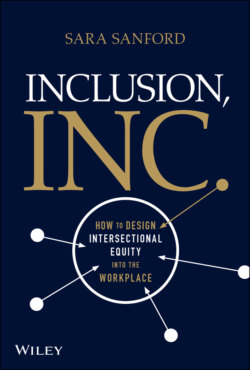Читать книгу Inclusion, Inc. - Sara Sanford - Страница 15
A Perspective Shift: From Changing Mindsets to Changing Mechanics
ОглавлениеIn a 1972 interview with Playboy magazine, the visionary architect, inventor, and philosopher Buckminster Fuller introduced the timeless wisdom of the trim tab—a small mechanism that helps stabilize an enormous ship or aircraft—which would become a central metaphor in his philosophy:
Something hit me very hard once, thinking about what one little man could do. Think of the Queen Elizabeth—the whole ship goes by and then comes the rudder. And there's a tiny thing at the edge of the rudder called a trim tab. It's a miniature rudder. Just moving the trim tab builds a low pressure that pulls the rudder around. Takes almost no effort at all. So I said that the little individual can be a trim tab. Society thinks that's it going right by you, that it's left you altogether. But if you're doing dynamic things mentally, the fact is that you can just put your foot out like that and the whole big ship of state is going to go. So I said, “Call me trim tab.”
The truth is that you get the low pressure to do things, rather than getting on the other side and trying to push the bow of the ship around. And you build that low pressure by getting rid of a little nonsense, getting rid of things that don't work and aren't true until you start to get that trim-tab motion.
To reorient our businesses toward a more inclusive future, we need to stop asking employees to push harder against the bow of the ship, and instead, decrease the resistance employees face. We need trim tabs. The environmentalist movement gives us a good example of what this looks like.
Let's say you're an environmentalist who's traveled out of town to present your findings at a conference. While you're prepping for your presentation and running back and forth to networking events, your values don't change, but your focus and your actions might. You may be distracted and less vigilant about turning the lights or AC off in your hotel room every time you leave. Despite your environmentalist moral core, you're accidentally wasting energy.
European hotels figured out a behavioral design hack that reduces their energy bills and makes it easier for their environmentally conscious guests to act in alignment with their values.12 Hotel guests must place a room key into a slot on the wall to activate the lights and temperature control system in their rooms. When they leave the room and take their key with them, they don't have to think about turning off the lights or the air conditioning. They just turn off when the key card is absent. By adding a trim tab, the design of the room has taken thinking (and willpower) out of the equation.
The human brain carries at least 200 unconscious biases that cognitive science has recognized.13 Scientists estimate that unconscious biases drive between 75 and 90 percent of our decision-making, without our even realizing it.14 Current approaches to DEI rely on employees to stay vigilant against incursions of unconscious biases that they're probably not even aware of, while performing well at challenging jobs. We're asking employees to push against the front of a very, very large ship, and we've seen how it's played out. We've plateaued. We've made all the progress we can make under the “try your best” model.
We still have a chance to change course. We can either ask employees to keep pushing against the front of the ship, or we can adjust our equity trim tabs and focus on correcting mechanics rather than mindsets.
